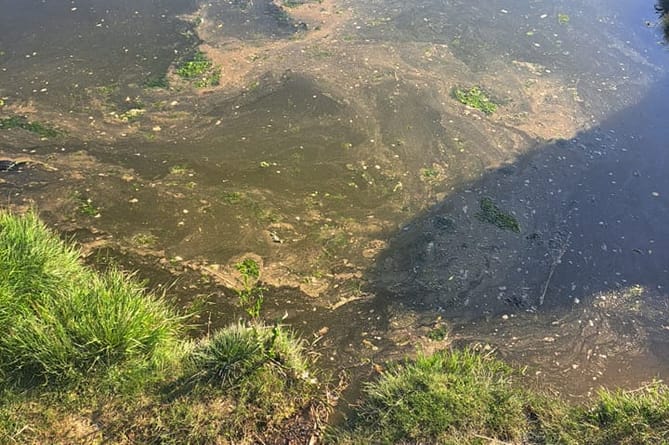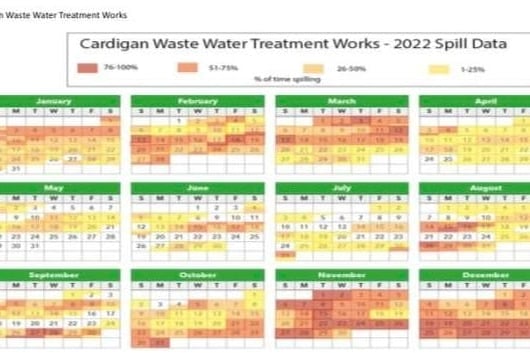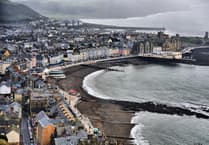Residents along the Afon Teifi are demanding an official apology and action plan from authorities to address the river's “longstanding pollution crisis”.
High phosphorus levels in the Cardigan river from illegal Dŵr Cymru/ Welsh Water sewage overflow has meant no new homes have been built for more than two years, whilst endangering the wildlife including salmon, sea trout, and otters who call the river their home.
Last October a report revealed Dŵr Cymru pumped millions of litres of untreated sewage into Welsh rivers including the Teifi. One of the worst performing water works was in Cardigan, when on 1,146 days between January 2018 and May 2023 untreated sewage was allowed to enter the Teifi without the works being at full capacity. Grassroots residents group Save the Teifi is now calling for a solid plan to be created, stating the “critical sewage pollution” has been unaddressed for over a decade.
A statement from the group released this week reads: “ The detailed report by Professor Peter Hammond in October 2023 labels the Cardigan area as the most egregious publicly-known case of sewage pollution in Wales. “The local community requires an official apology and a transparent, time-bound action plan for immediate improvements to the river and sewage works. This crisis has been a longstanding issue, and the time for action is now.”
The group called for “five asks” to be addressed- firstly, for works to address the excessive Cardigan sewage works overflow to be completed with a nature-based approach and “as quickly as possible... with any delay to be justified with concrete evidence”.

In response to the illegal polluting of the river a £42 million plan was launched in October 2023 by Dŵr Cymru, including a £20m to replace the Wastewater Treatment Works in Cardigan. The work is set to begin in April 2025, with a temporary package treatment plant to be installed last October.
Save the Teifi also call for increased monitoring and transparency of the water health in the river, estuary, and especially in the bathing water at Poppit Sands, contradicting Dŵr Cymru’s claim that the sewage overflow has had no environmental impact: “ The community reports a visible decline in biodiversity and river health.”
High phosphorus levels in water promote algae and aquatic plants to bloom, reducing oxygen levels which can be harmful to river flora and fauna. Algae blooms can produce toxins that are harmful to animals and humans.
On top of this, the group calls for a long-awaited citizens' science programme to begin this summer to support the assessment of water quality and encourage a “cooperative relationship between the community and authorities”.
Save the Teifi also demands the failures of Natural Resources Wales (NRW), the regulatory body be addressed, having failed to penalise unpermitted sewage spillages. They call for NRW, a Welsh Government sponsored body, to be given more resources so it can function as a “true regulator and protector of nature”. The UK’s private water companies are legally entitled to release sewage to relieve pressure on the system, mostly during periods of extreme weather.

Dŵr Cymru and NRW data suggest there is approximately 45kg of phosphorus discharged daily in the Teifi, from sewage, abandoned metal mines, and diffuse pollution from land runoff.
Finally, the group calls for the executive management of Dŵr Cymru and NRW to take responsibility for the extended pollution over the years with financial compensation to go towards environmental stewardship of the river. This comes after the chief executive of Dŵr Cymru was recently awarded a £20,000 pay rise.
In response to this call for action, Ann Weedy, Operations Manager at NRW, said they are exploring the potential of a citizen science programme, adding: “We fully understand the community’s anguish over sewage discharges from the Cardigan Wastewater Treatment Works, and the length of time it is taking to resolve this complex issue.
“We want to reassure everyone concerned that doing so remains a key priority for NRW, and we continue to press Dŵr Cymru to drive forward the significant upgrades at this site that we all want to see.
“We will play an active role in the remediation plans to ensure that new proposals are robust enough to meet our environmental permit requirements to protect the Afon Teifi and surrounding bathing waters.
“NRW is driving a wider initiative to improve water quality and biodiversity in the catchment, known as the Teifi Demonstrator Catchment Project, for which we have welcomed the valuable insight from the Save the Teifi Group.”
A spokesperson from Dŵr Cymru said: “We are aware of the Five Asks and have responded to the Save the Teifi Group in full.
“Plans for the £20 million redevelopment of Cardigan wastewater treatment works are advancing and we are working with our supply chain, contractors, and regulators to bring forward our plans in the hope we can start ahead of the planned date of April 2025.
“A planning application is due to be submitted in the next couple of months. Any updates will be communicated with the local community.
“We are always sorry for any adverse impact we have on the environment and we intend to fully engage with communities on the Teifi as we deliver our planned investment and play our part in the ambitious Teifi Demonstrator Catchment proposal.”


.jpeg?width=209&height=140&crop=209:145,smart&quality=75)

Comments
This article has no comments yet. Be the first to leave a comment.